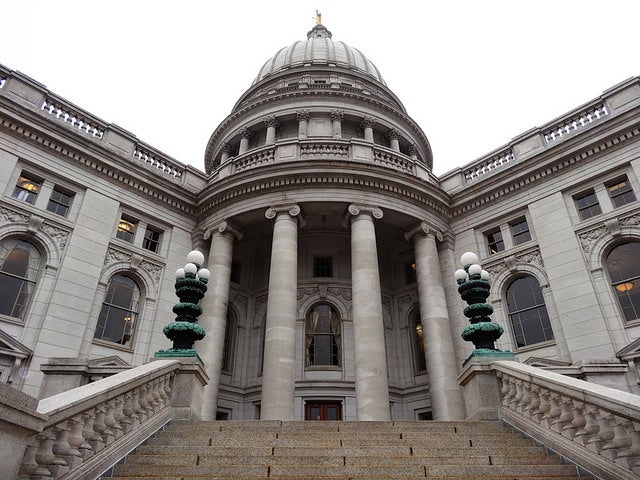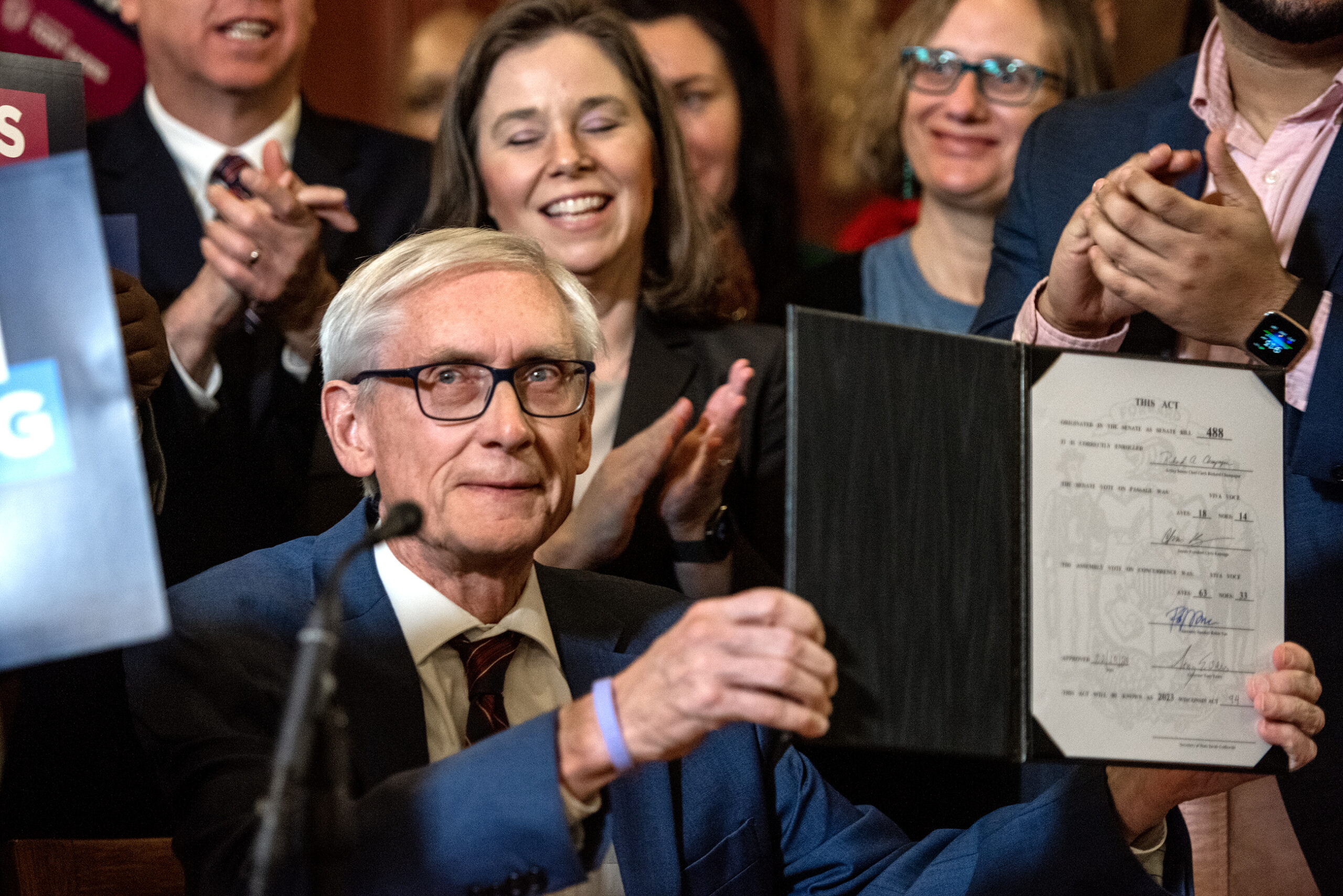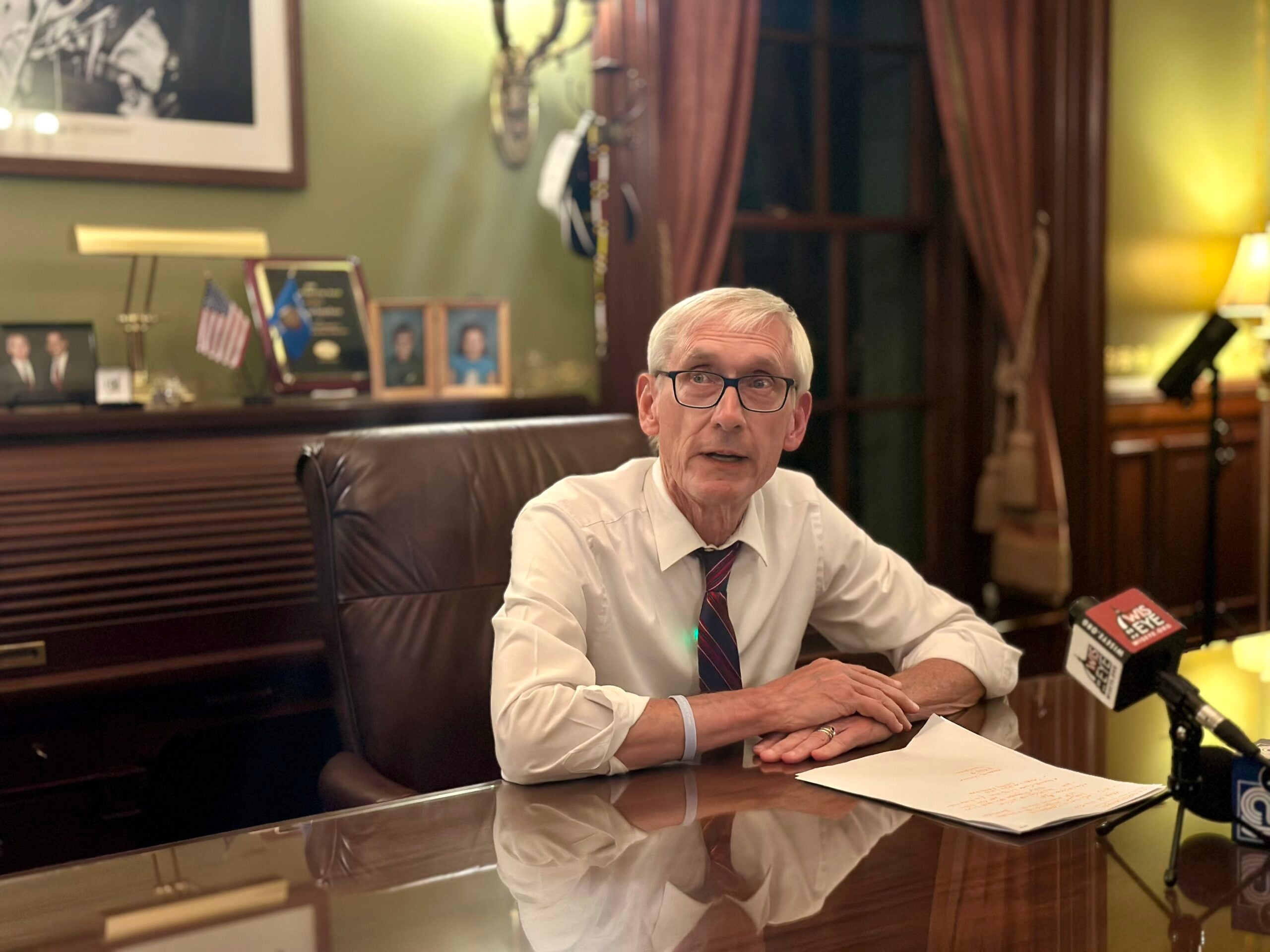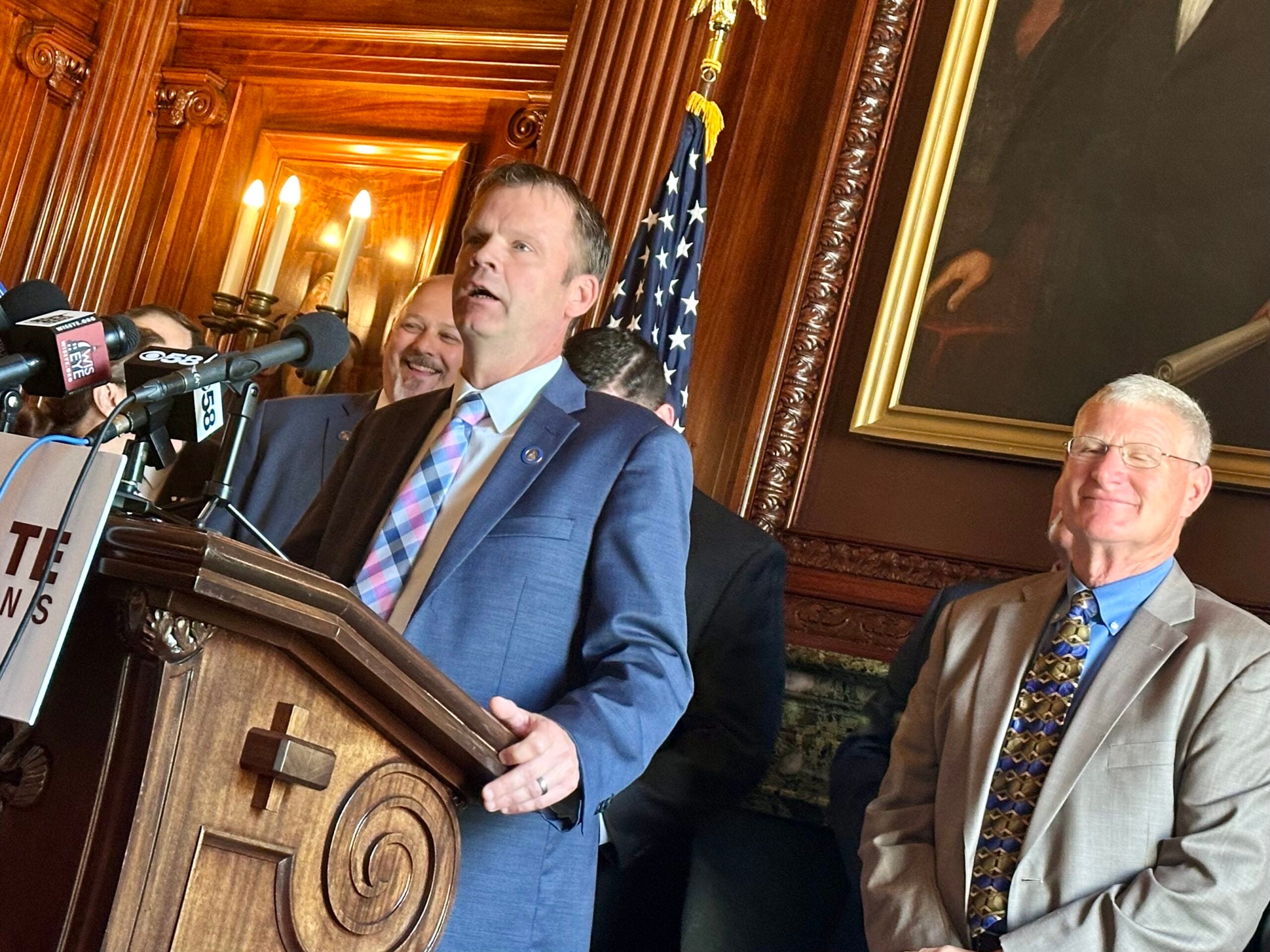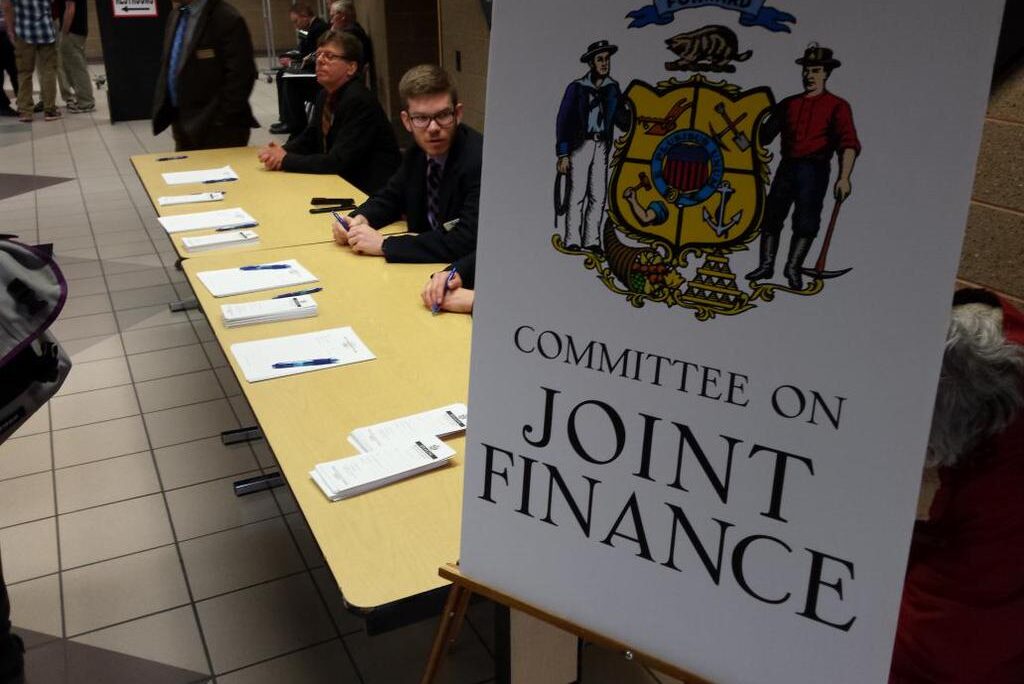Wisconsin lawmakers gave final approval Tuesday to major pieces of Gov. Scott Walker’s 2018 agenda, including a plan that would send government funds to insurance companies in an effort to shore up the Affordable Care Act’s private marketplace in Wisconsin.
The state Senate also sent nine bills to Walker’s desk that would restrict access to public benefits for low-income residents as part of the governor’s special session on welfare reform.
The measures are among several Walker called for in January that have since moved briskly through the Republican-controlled Legislature.
News with a little more humanity
WPR’s “Wisconsin Today” newsletter keeps you connected to the state you love without feeling overwhelmed. No paywall. No agenda. No corporate filter.
Here are some of Tuesday’s highlights:
Reinsurance
Both the Senate and Assembly voted Tuesday to approve a plan that would allow the state to apply for a federal waiver to offer reinsurance to Affordable Care Act insurers in Wisconsin.
Under the bill, the state would help insurers cover their most expensive claims, a move that Walker has said will stabilize insurance premiums on the private market.
The Assembly passed 76-19, with some Democrats joining Republicans to support the bill.
The Senate passed its version of the bill on an unusual 23-9 vote, with Republicans and Democrats both for and against.
“Health care is being controlled by politicians thousands of miles away in Washington, D.C., so what we have to do is look at what we can do locally, within the framework of the Affordable Care Act, to move forward on how we can stabilize Wisconsin’s market,” said state Rep. Kevin Petersen, R-Waupaca.
The plan would use $50 million in state funds in order to leverage $150 million in federal funding. The Legislature’s nonpartisan budget office has said the state’s share of the plan could potentially be higher.
State Sen. Jon Erpenbach, D-Middleton, told colleagues it was ironic that Walker was supporting the plan given his support for GOP efforts to repeal the ACA.
“Yet here we are in the state Senate embracing a portion of Obamacare,” Erpenbach said.
The bill now moves to the governor for his signature.
Welfare
The Senate voted along party lines to pass nine out of 10 of Walker’s welfare bills Tuesday.
Among the proposals is one that would require parents with school-aged children to work or participate in job training for 30 hours per week to receive food stamps.
Another would restrict access to food stamps if someone owns a car worth $20,000 or a home worth $334,000 or more.
Republicans argued they’d lift people out of poverty by encouraging them to work.
“If we’re going to help people find their purpose again, we want to engage them in work,” said Sen. Chris Kapenga, R-Delafield. “Because the reality is, the programs that we have relied upon historically, they’re not working.”
Democrats called the plans punitive, and an election-year gimmick to fire up the Republican base.
“We are putting a punishment on people who find themselves in dire circumstances,” said Sen. Janet Bewley, D-Mason. “And to suggest that they’re there by choice is just inaccurate.”
The Assembly passed Walker’s special session bills last week, mostly along party lines.
The bills now head back to Walker, who issued a statement thanking the Legislature for its vote.
One of Walker’s welfare bills wasn’t on Tuesday’s agenda: a plan that would require a photo ID for food stamp recipients.
School Spending
Senators also sent another bill to Walker’s desk allowing low-spending school districts to increase property taxes without asking voters’ permission first.
The plan is similar to one Walker vetoed in last year’s budget debate.
Under the bill, school districts that spend less than $9,400 per student could raise taxes without going to referendum.
This latest version also includes a provision that would bar school districts from increasing taxes if local voters had rejected a referendum within the last three years.
The bill passed the Senate by a vote of 31-1 with only Sen. Dave Craig, R-Big Bend, voting against.
It passed the Assembly on a 90-3 vote last week.
Democratic senators tried unsuccessfully to amend the plan to let schools increase local property taxes to pay for school safety expenses.
‘Midwest Millennial’ Campaign
Assembly lawmakers on Tuesday approved another Walker proposal to spend $6.8 million in state funds on attracting workers to Wisconsin.
The measure passed on a 67-28 vote.
Walker has indicated the state would use the funding to advertise Wisconsin in other states, in the hopes that it will attract “Midwest millennials” to move here from places like Chicago and Minneapolis.
“It adds up, the cost of living in Chicago,” said Rep. Amy Loudenbeck, R-Clinton. “People want to get out of the city, they’re sick of the hustle and bustle and getting nickel and dimed to death.”
Democrats have argued the state funds would be put to better use by offering job training to Wisconsin residents.
“Advertising is great, but we really need to take care of our own citizens in this state,” said Rep. Gary Hebl, D-Sun Prairie.
The plan still needs to pass the state Senate.
Rural Economic Development
The Assembly also voted to approve a proposal Tuesday to funnel $50 million into rural economic development programs across Wisconsin.
Lawmakers passed the bill with a unanimous vote of 95-0. It still needs to be approved by the state Senate.
Rep. Travis Tranel, R-Cuba City, the bill’s sponsor, said he believes the fund will help attract more young people to rural Wisconsin.
“One of our biggest obstacles we face in rural Wisconsin is a shortage of people,” Tranel said.
Walker announced the plan last month.
The $50 million annual fund, to be paid out annually for the next 20 years, would be used for initiatives including low-interest loans to dairies and a new scholarship program for students who take agriculture classes at state colleges.
Grants would be disbursed through existing state programs, with the payouts overseen by the Wisconsin Economic Development Corp.
Lincoln Hills
Assembly GOP leaders said they would debate and pass a plan Wednesday that would close the troubled Lincoln Hills youth prison.
The move comes even as the Senate’s top Republican has warned changes could be needed in order to pass it before the Legislature adjourns in March.
The measure follows years of reported abuse at Lincoln Hills and recent reports that the corrections officers working there no longer feel safe.
Under the bill, Lincoln Hills would close by July 2020 and send many of the juvenile inmates there now to smaller, county-run institutions spread out at possibly a half-dozen locations throughout Wisconsin. Serious juvenile offenders would be moved to other state-run institutions.
The bill was introduced, given a public hearing and voted out of committee last week despite concerns from counties that they were being asked to assume a lot of the risk in the proposal.
Walker has said it’s “imperative” the Legislature pass a version of the bill before they adjourn. Sen. Majority Leader Scott Fitzgerald, R-Juneau, said he agrees with the bill in concept, but called its passage a “big lift” before the end of session.
Editor’s Note: This story was last updated at 10:50 p.m. Tuesday, Feb. 20, 2018.
Wisconsin Public Radio, © Copyright 2025, Board of Regents of the University of Wisconsin System and Wisconsin Educational Communications Board.

